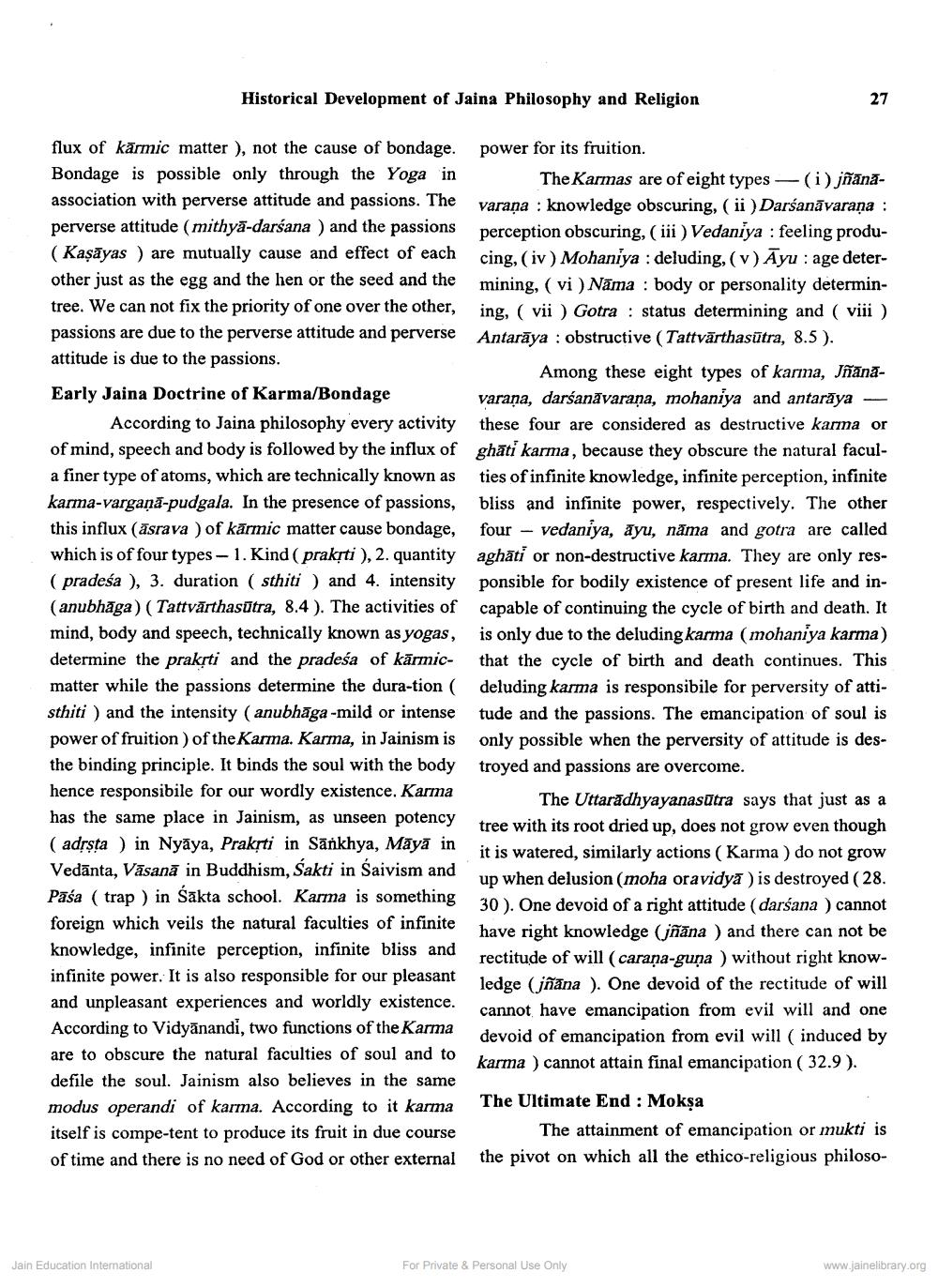Book Title: Historical Development of Jaina Philosophy and Religious Author(s): Sagarmal Jain Publisher: Z_Shwetambar_Sthanakvasi_Jain_Sabha_Hirak_Jayanti_Granth_012052.pdf View full book textPage 6
________________ Historical Development of Jaina Philosophy and Religion flux of kārmic matter ), not the cause of bondage power for its fruition. Bondage is possible only through the Yoga in The Karmas are of eight types — (i) jñānaassociation with perverse attitude and passions. The varana : knowledge obscuring, (ii) Darsanāvarana : perverse attitude (mithya-darśana ) and the passions perception obscuring, (iii) Vedaniya : feeling produ( Kaṣāyas ) are mutually cause and effect of each cing, (iv) Mohaniya : deluding, (v) Ayu : age deterother just as the egg and the hen or the seed and the mining, (vi) Nama : body or personality determintree. We can not fix the priority of one over the other, ing, ( vii ) Gotra : status determining and (viii) passions are due to the perverse attitude and perverse Antarāya : obstructive (Tattvārthasūtra, 8.5). attitude is due to the passions. Among these eight types of karma, JñanaEarly Jaina Doctrine of Karma/Bondage varana, darśanăvarana, mohaniya and antarāya — According to Jaina philosophy every activity these four are considered as destructive karma or of mind, speech and body is followed by the influx of ghāti karma, because they obscure the natural facula finer type of atoms, which are technically known as ties of infinite knowledge, infinite perception, infinite karma-vargaņā-pudgala. In the presence of passions, bliss and infinite power, respectively. The other this influx (āsrava ) of kārmic matter cause bondage, four - vedaniya, ayu, nāma and gotra are called which is of four types - 1. Kind (praksti ), 2. quantity aghāti or non-destructive karma. They are only res(pradeśa ), 3. duration ( sthiti ) and 4. intensity ponsible for bodily existence of present life and in(anubhāga) (Tattvārthasūtra, 8.4). The activities of capable of continuing the cycle of birth and death. It mind, body and speech, technically known as yogas, is only due to the deluding karma (mohaniya karma) determine the prakti and the pradeśa of kārmic- that the cycle of birth and death continues. This matter while the passions determine the dura-tion deluding karma is responsibile for perversity of attisthiti ) and the intensity (anubhāga -mild or intense tude and the passions. The emancipation of soul is power of fruition ) of the Karma. Karma, in Jainism is only possible when the perversity of attitude is desthe binding principle. It binds the soul with the body troyed and passions are overcome. hence responsibile for our wordly existence. Karma The Uttaradhyayanasutra says that just as a has the same place in Jainism, as unseen potency tree with its root dried up, does not grow even though ( adrsta ) in Nyāya, Prakrti in Sankhya, Māyā in it is watered, similarly actions ( Karma ) do not grow Vedānta, Vāsanā in Buddhism, Śakti in Saivism and up when delusion (moha oravidya ) is destroyed (28. Pāśa ( trap ) in sākta school. Karma is something mething 2017 30). One devoid of a right attitude (darśana ) cannot foreign which veils the natural faculties of infinite have right knowledge (ñana ) and there can not be knowledge, infinite perception, infinite bliss and rectitude of will (carana-guna ) without right knowinfinite power. It is also responsible for our pleasant ledge (jñana ). One devoid of the rectitude of will and unpleasant experiences and worldly existence. cannot have emancipation from evil will and one According to Vidyānandi, two functions of the Karma devoid of emancipation from evil will ( induced by are to obscure the natural faculties of soul and to karma ) cannot attain final emancipation ( 32.9). defile the soul. Jainism also believes in the same modus operandi of karma. According to it karma The Ultimate End : Mokşa itself is compe-tent to produce its fruit in due course The attainment of emancipation or mukti is of time and there is no need of God or other external the pivot on which all the ethico-religious philoso Jain Education International For Private & Personal Use Only www.jainelibrary.orgPage Navigation
1 ... 4 5 6 7 8 9 10 11 12 13
